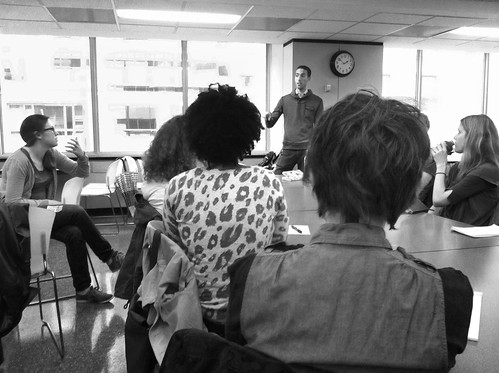Class Report
Money Resolutions 101: Planning for the Future

Teacher: Jon Menaster, policy analyst (center)
Documentarians: Greg Giles (text), Brigitta Blair (photos)
Date: March 29, 2014
See more photos of this class on Flickr!
How did you get interested in this subject?
Jon: I first became interested in personal finance when I began reading economics books (nerd alert!) while working in Los Angeles after college. That got me interested in economics, which brought me to American University for a master’s in international economic relations. From there, I was hired by the Government Accountability Office to examine financial markets issues. All that research made me realize that most people don’t get any help deciphering these complex issues.
What do people tend to wrongly assume about this subject before learning about it?
Jon: One of the big wrong assumptions is that everybody you come in contact with is there to help you and only has your best interests at heart. Unless the person (your financial adviser, your retirement planner, etc.) has a fiduciary responsibility to you, they actually don’t have to put your interests first, and that surprised me!
What should I read/watch to learn more?
Jon: To start on your path to learning, I recommend a great PBS Frontline documentary called “The Retirement Gamble,” which is all about how fees are damaging our retirement. Besides that, try reading “A Random Walk Down Wall Street” and “The Bogleheads’ Guide to Investing.” Both are excellent and easy to read.
What was the take-home message of the class?
Greg: There is a relatively straightforward, step-based approach to personal finance that most people can follow. The process fits everyone a little differently, but the variables are essentially the same.
What was the most surprising thing you learned?
Greg: Investing early makes a huge difference. If you compare 10 years of investment to 20 years of investment, one does not just simply have twice the 10-year amount. Compound interest causes a snowball effect.
What did you learn that you can put into practice immediately?
Greg: Mint.com is a great resource to help alleviate the complexity and tedium of getting serious about your budget.

